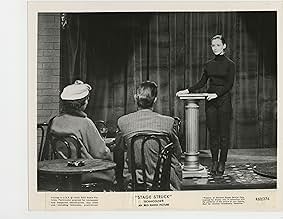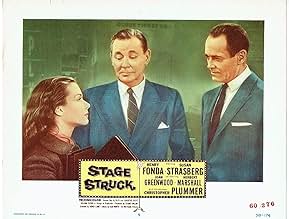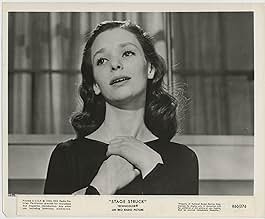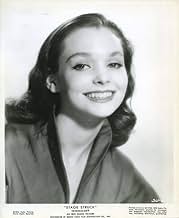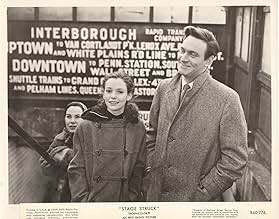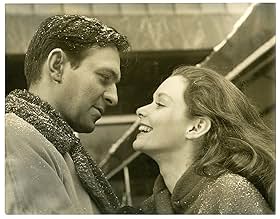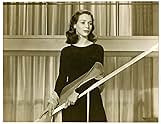Una joven llega a Nueva York decidida a convertirse en una gran estrella teatral, pero descubre que su objetivo puede no ser tan fácil de alcanzar como esperaba.Una joven llega a Nueva York decidida a convertirse en una gran estrella teatral, pero descubre que su objetivo puede no ser tan fácil de alcanzar como esperaba.Una joven llega a Nueva York decidida a convertirse en una gran estrella teatral, pero descubre que su objetivo puede no ser tan fácil de alcanzar como esperaba.
- Dirección
- Guionistas
- Elenco
Pat Harrington Sr.
- Benny
- (as Pat Harrington)
Pat Englund
- Gwen Hall
- (as Patricia Englund)
Merle A. Ashley
- Minor Role
- (sin créditos)
Dario Barri
- Handsome Young Man
- (sin créditos)
Rolly Bester
- Minor Role
- (sin créditos)
Leon Bibb
- Guitar Player
- (sin créditos)
- Dirección
- Guionistas
- Todo el elenco y el equipo
- Producción, taquilla y más en IMDbPro
Opiniones destacadas
Strasberg gives what is perhaps one of the worst performances by an actress in an "A" film. Her acting is jaw-droppingly terrible, and "over-the-top" is too kind of a phrase. She obviously took her father's instruction to heart - he being Lee Strasberg of the Actor's Studio. The "waiting-for-the-reviews" party during the first thirty-minutes of the film actually contains a cring-worthy rendition of the famous balcony scene from "Romeo & Juliet."
Of course, director Lumet has a tendency to allow his performers to chew the scenery. Fonda is an exception, though. He provides his usual subdued interpretation. Plummer comes across quite nicely, as well.
However, the "romantic" conclusion is totally ridiculous, as there is zero chemistry between the characters who finally end up with one another.
I forced myself to watch this film till the end, but it wasn't easy. Not surprisingly, Strasberg's career eventually settled into "B" movies, and hammy TV roles.
Of course, director Lumet has a tendency to allow his performers to chew the scenery. Fonda is an exception, though. He provides his usual subdued interpretation. Plummer comes across quite nicely, as well.
However, the "romantic" conclusion is totally ridiculous, as there is zero chemistry between the characters who finally end up with one another.
I forced myself to watch this film till the end, but it wasn't easy. Not surprisingly, Strasberg's career eventually settled into "B" movies, and hammy TV roles.
As several reviewers have remarked, the chief attraction of Sidney Lumet's film lies in its evocation of New York in the mid-Fifties. From its opening tracking shots of Broadway, showing the popular shows of the time (including SEPARATE TABLES), to the regular establishing shots of the cars and taxicabs moving endlessly up and down, the film makes us aware of the fact that the action will take place in a confined location, wherein everyone knows everyone else.
In this kind of environment, egos are both fragile yet inflated. Joan Greenwood's Rita Vernon offers a prime example - someone who believes in her abilities as an "ACTOR," yet perpetually haunted by the belief that she could somehow lose her stardom. Hence her relentless pursuit of producer Lewis Easton (Henry Fonda). The sequence where they negotiate her future contract, while locked in a passionate embrace, is masterly, revealing how personal and professional issues are inseparable.
As the would-be star "Eva Lovelace" (the falseness of the name reveals how artificial Broadway life actually is), Susan Strasberg represents a breath of fresh air. While certainly not possessed of the acting- skills of her illustrious costars, she possesses a sincerity of purpose that proves extremely attractive. Her rendition of the balcony-scene from ROMEO AND JULIET at Easton's first night party is strangely haunting. Director Sidney Lumet understands this, which helps to explain why he shoots the sequence in a series of close-ups, focusing our attention on Strasberg's open countenance as she looks straight into Easton's face.
The story is a familiar one, as Lovelace takes over from Vernon in the lead role of a new play written by Joe Sheridan (Christopher Plummer) and shoots to stardom after the first night. Lumet wisely chooses not to focus on the performance itself, but rather on the backstage reactions: Strasberg's wide-eyed expression of disbelief at her achievement is contrasted with the superficial reactions of miscellaneous theatrical hangers-on, who come to congratulate her with the usual platitudes ("Dahling, you were marvelous, always though you'd make it"). The film's ending is perhaps too drawn-out, consisting of an extended dialog between Lovelace and Easton, but what emerges most tangibly is the fact that Lovelace has no real need to go and celebrate at Sardi's (as directed by theatrical custom). She is happy just to stand on the stage, looking out at the auditorium and reflect on what happened during the last two hours or so. Although very much implicated in the world of Broadway falseness, Easton comes to understand her state of mind and blows her a kiss ("just from me"). Sometimes sincerity can triumph over artifice.
STAGE STRUCK is full of intertexts: Eva's name is a direct sonic reference to Joseph L. Mankiewicz's ALL ABOUT EVE (1950), another classic exposé of Broadway hypocrisies. At one point elderly actor Robert Hedges (Herbert Marshall) advises Lovelace to complete her education at the Actors' Studio, which just happened to be run by Strasberg's real-life father Lee Strasberg.
The basic plot of STAGE STRUCK might be familiar - as other reviewers have remarked, it is a remake of MORNING GLORY (1933) - but there are plenty of ingredients within the ninety-minute running-time to interest all types of viewer.
In this kind of environment, egos are both fragile yet inflated. Joan Greenwood's Rita Vernon offers a prime example - someone who believes in her abilities as an "ACTOR," yet perpetually haunted by the belief that she could somehow lose her stardom. Hence her relentless pursuit of producer Lewis Easton (Henry Fonda). The sequence where they negotiate her future contract, while locked in a passionate embrace, is masterly, revealing how personal and professional issues are inseparable.
As the would-be star "Eva Lovelace" (the falseness of the name reveals how artificial Broadway life actually is), Susan Strasberg represents a breath of fresh air. While certainly not possessed of the acting- skills of her illustrious costars, she possesses a sincerity of purpose that proves extremely attractive. Her rendition of the balcony-scene from ROMEO AND JULIET at Easton's first night party is strangely haunting. Director Sidney Lumet understands this, which helps to explain why he shoots the sequence in a series of close-ups, focusing our attention on Strasberg's open countenance as she looks straight into Easton's face.
The story is a familiar one, as Lovelace takes over from Vernon in the lead role of a new play written by Joe Sheridan (Christopher Plummer) and shoots to stardom after the first night. Lumet wisely chooses not to focus on the performance itself, but rather on the backstage reactions: Strasberg's wide-eyed expression of disbelief at her achievement is contrasted with the superficial reactions of miscellaneous theatrical hangers-on, who come to congratulate her with the usual platitudes ("Dahling, you were marvelous, always though you'd make it"). The film's ending is perhaps too drawn-out, consisting of an extended dialog between Lovelace and Easton, but what emerges most tangibly is the fact that Lovelace has no real need to go and celebrate at Sardi's (as directed by theatrical custom). She is happy just to stand on the stage, looking out at the auditorium and reflect on what happened during the last two hours or so. Although very much implicated in the world of Broadway falseness, Easton comes to understand her state of mind and blows her a kiss ("just from me"). Sometimes sincerity can triumph over artifice.
STAGE STRUCK is full of intertexts: Eva's name is a direct sonic reference to Joseph L. Mankiewicz's ALL ABOUT EVE (1950), another classic exposé of Broadway hypocrisies. At one point elderly actor Robert Hedges (Herbert Marshall) advises Lovelace to complete her education at the Actors' Studio, which just happened to be run by Strasberg's real-life father Lee Strasberg.
The basic plot of STAGE STRUCK might be familiar - as other reviewers have remarked, it is a remake of MORNING GLORY (1933) - but there are plenty of ingredients within the ninety-minute running-time to interest all types of viewer.
Vermont girl Gertrude Langenfelder (Susan Strasberg) has come to New York City to be a Broadway star under the stage name Eva Lovelace. She's desperate to get any part with producer Lewis Easton (Henry Fonda). Joe Sheridan (Christopher Plummer) is the writer. Despite not liking the role, Rita Vernon (Joan Greenwood) is the leading lady.
This movie depends a lot on Susan Strasberg's performance. All I can say is that she enunciates her lines very knowingly. She's playing a part when the role requires her to be an IT girl. She has to be a newly born diamond outshining all the other diamonds. It's asking a lot and she struggles. I'm sure that her father taught her well but there is something innate about stardom. Every moment with her is a performance when she needs to simply be a superstar. The role may be classified as a try-hard but the actress cannot be just try-hard. The difference is the margin between functional and greatness. This movie has enough acting power to light up Broadway but Susan's flickering light leaves a dull spot at its center. The simple story is not original enough to overpower its flaws.
This movie depends a lot on Susan Strasberg's performance. All I can say is that she enunciates her lines very knowingly. She's playing a part when the role requires her to be an IT girl. She has to be a newly born diamond outshining all the other diamonds. It's asking a lot and she struggles. I'm sure that her father taught her well but there is something innate about stardom. Every moment with her is a performance when she needs to simply be a superstar. The role may be classified as a try-hard but the actress cannot be just try-hard. The difference is the margin between functional and greatness. This movie has enough acting power to light up Broadway but Susan's flickering light leaves a dull spot at its center. The simple story is not original enough to overpower its flaws.
There is a strange artificiality to Susan Strasberg's performance which really throws this movie off kilter. Obviously she's playing a very theatrical young woman who lives for the stage, and in certain scenes (particularly the party scene where she is not only intoxicated from champagne but the dreamy proximity to so many Broadway celebrities) this technique is effective, but she never turns it off. In tender, heartfelt moments with Henry Fonda's seasoned producer and Christopher Plummer's blossoming playwright, both of whom are supposed to be madly in love with her, she's frightfully unresponsive. She's like a pretty little China Doll whose eyes can blink.
Nevertheless, there is much to like about this film. Fonda, Plummer and Herbert Marshall are superb as various incarnations of success who all become enchanted with Strasberg and her bewildering determination to be a star. They are all caught up in the complicated and decidedly unromantic machinery of the theatre world, and she represents the innocence they've either forgotten (Marshall), lost (Fonda), or are in jeopardy of losing (Plummer). (Although again, as Strasberg plays her, the innocence seems like a put-on, a florid, elaborate joke.) Part of the pleasure of the film is seeing Plummer in one of his very first, pre-"Sound of Music" roles. A darkly compelling leading man during this time with brooding traces of the new method acting style, he and the old school Fonda work well together - there's an interesting "passing the torch" dynamic there.
But the real reason to see this film is the stunning location photography of New York City. The director, Sidney Lumet, has always loved the city just as much as Woody Allen, and here it is practically the star. There is an exquisite scene in a snow blanketed park (Central?) that is as vivid as being there.
There is an added poignancy to this picture as Strasberg's part as an actress on the verge of "making it" was, I believe, intended to neatly dovetail with her own emerging stardom. A stardom that was, alas, to be short-lived.
Nevertheless, there is much to like about this film. Fonda, Plummer and Herbert Marshall are superb as various incarnations of success who all become enchanted with Strasberg and her bewildering determination to be a star. They are all caught up in the complicated and decidedly unromantic machinery of the theatre world, and she represents the innocence they've either forgotten (Marshall), lost (Fonda), or are in jeopardy of losing (Plummer). (Although again, as Strasberg plays her, the innocence seems like a put-on, a florid, elaborate joke.) Part of the pleasure of the film is seeing Plummer in one of his very first, pre-"Sound of Music" roles. A darkly compelling leading man during this time with brooding traces of the new method acting style, he and the old school Fonda work well together - there's an interesting "passing the torch" dynamic there.
But the real reason to see this film is the stunning location photography of New York City. The director, Sidney Lumet, has always loved the city just as much as Woody Allen, and here it is practically the star. There is an exquisite scene in a snow blanketed park (Central?) that is as vivid as being there.
There is an added poignancy to this picture as Strasberg's part as an actress on the verge of "making it" was, I believe, intended to neatly dovetail with her own emerging stardom. A stardom that was, alas, to be short-lived.
Along with "All About Eve" this is one of the finest films dealing with the American theatre. I don't understand why it is a lost film and would urge anybody who enjoys great acting to hunt this film down any way they can. It is also about time it was released on video. Susan Strasberg was clearly one of Hollywood's casualties and it's tragic that the films she made after this were perhaps determined by the mediocre reaction at the time to this film.
¿Sabías que…?
- TriviaEva Lovelace (Susan Strasberg) is told to join the Actors Studio to learn her craft. In real life, Strasberg was the daughter of Lee Strasberg, the acting coach and director of the studio.
- Citas
Lewis Easton: [to Eva] You're a hungry little girl - the theater's offering you a feast.
- ConexionesFeatured in Hollywood the Golden Years: The RKO Story: Howard's Way (1987)
Selecciones populares
Inicia sesión para calificar y agrega a la lista de videos para obtener recomendaciones personalizadas
- How long is Stage Struck?Con tecnología de Alexa
Detalles
- Fecha de lanzamiento
- País de origen
- Idioma
- También se conoce como
- Eines Tages öffnet sich die Tür
- Locaciones de filmación
- Productoras
- Ver más créditos de la compañía en IMDbPro
- Tiempo de ejecución1 hora 35 minutos
- Color
- Relación de aspecto
- 1.37 : 1
Contribuir a esta página
Sugiere una edición o agrega el contenido que falta


